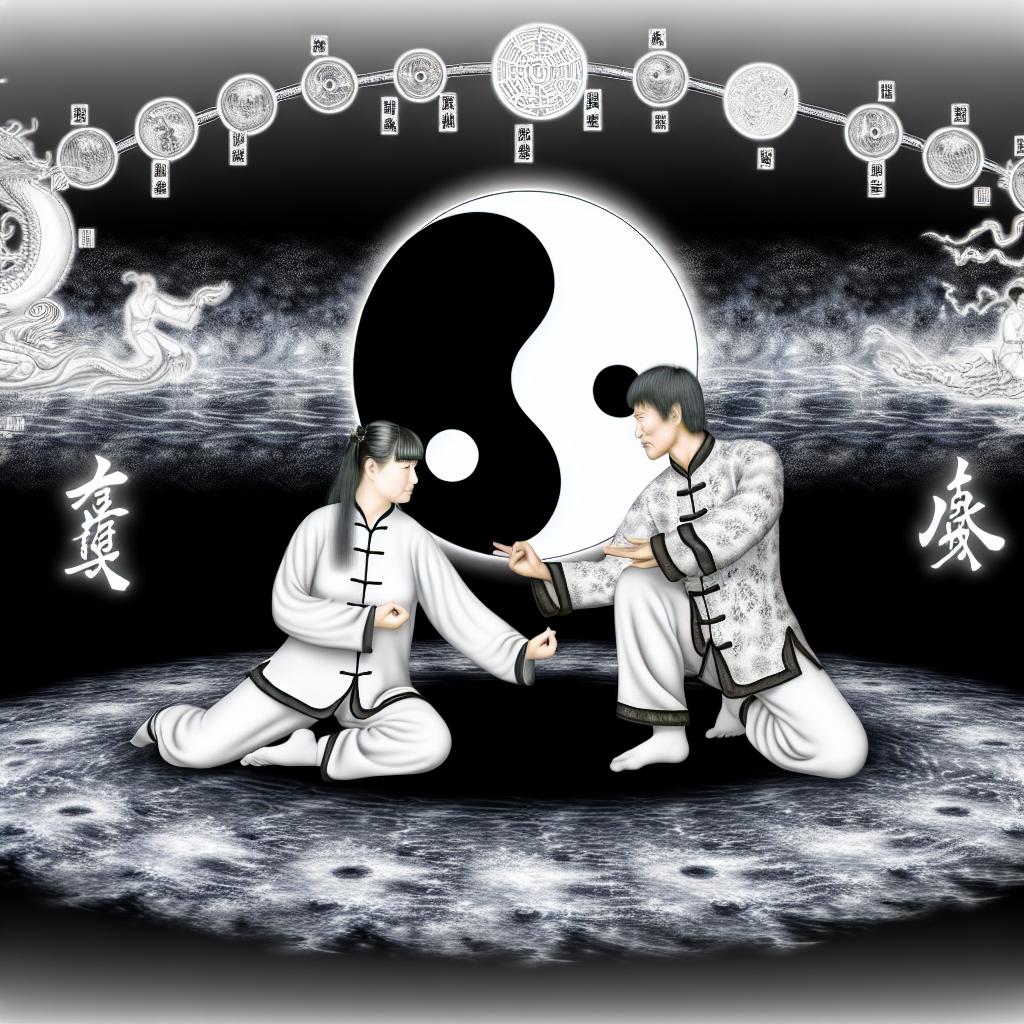
The Influence of Taoism on Kung Fu
Taoism, a philosophical and spiritual tradition that originated in China, has played a significant role in the development of Kung Fu, both as a martial art and a way of life. This connection is evident in the foundational concepts and practices of Kung Fu that are deeply rooted in Taoist philosophy.
The Concept of Ying and Yang
One of the core principles of Taoism that extensively influences Kung Fu is the concept of Yin and Yang. These elements represent the dual nature of everything in the universe, emphasizing balance and harmony. In Kung Fu, this principle guides practitioners to balance hard and soft techniques, offensive and defensive movements, and strength with flexibility. The dynamic interplay of Yin and Yang is crucial in creating a powerful yet fluid fighting style. The symbol of Yin and Yang, often represented by the Tai Chi symbol, embodies the idea that opposing forces are interconnected and interdependent in the natural world. Each part contains the seed of the other, highlighting that imbalance in one direction calls for a natural correction.
In a Kung Fu setting, this translates into an understanding of the importance of adaptability. If an opponent exerts force, the practitioner might respond with yielding, blending with the force before finding an opportune moment to become firm. This flow is reminiscent of water, an element often cited in Taoist texts for its natural adaptability and power.
Wu Wei and Martial Arts
Another Taoist principle that significantly impacts Kung Fu is Wu Wei, often translated as “non-action” or “effortless action.” In martial arts, Wu Wei encourages practitioners to move naturally and fluidly, without forcing their actions. The principle teaches that one should not act against the natural flow but rather work with it to achieve the desired outcome. This approach is essential in developing the grace, efficiency, and adaptability seen in accomplished Kung Fu practitioners.
The emphasis of Wu Wei lies in the idea that the best actions are those that do not appear forced. For Kung Fu practitioners, this means that movements should come from a place of inner stillness and awareness, manifested in a state of relaxed readiness rather than tension. This practice leads to efficient energy use, reducing unnecessary movements or energy expenditure, which is a hallmark of masterful martial arts practice.
The Practice of Ziran
Taoism also promotes the principle of Ziran, meaning “naturalness” or “spontaneity.” In Kung Fu, this principle encourages martial artists to trust their instincts and train to react naturally in a given situation. This natural flow allows practitioners to respond effectively to an opponent’s actions without deliberate thought, leading to quicker and more intuitive movements.
The concept of Ziran speaks to the essence of individual expression in Kung Fu, where practitioners learn forms and techniques but are encouraged to adapt them to their unique physical and mental attributes. Through disciplined practice, the forms become internalized, allowing practitioners to transcend rigid forms and move spontaneously, applying learned techniques in a way that feels natural to their unique body and mind.
Embracing Qi (Chi)
The concept of Qi (pronounced “Chi”) is another essential element borrowed from Taoism that plays a vital role in Kung Fu. Qi is considered the life force or energy that flows through all living things. In martial arts, understanding and harnessing Qi can enhance physical power, focus, and mental clarity. Many Kung Fu training methods, such as meditation and breathing exercises, aim to cultivate and control Qi, contributing to more effective martial techniques and overall well-being.
Through controlled breathing (Qi Gong), practitioners aim to circulate and strengthen Qi to improve health and augment martial abilities. In combat, being attuned to one’s Qi can mean the difference between a powerful strike and an inefficient one, guiding the practitioner to apply force both economically and effectively.
Additionally, developing awareness of Qi allows martial artists to cultivate greater mindfulness and presence, elements crucial in preventing conflicts or resolving them with minimal violence. This cultivates a holistic practice in which mental cultivation is as vital as physical training.
Taoism’s influence on Kung Fu is evident in the martial art’s emphasis on balance, adaptability, and natural movement. These Taoist principles not only enrich Kung Fu practice but also offer a philosophical framework that guides practitioners towards personal growth and harmony with the universe.
Taoism Beyond Technique
Beyond the technical and physical aspects, Taoism deeply influences Kung Fu as a spiritual discipline. This philosophical framework encourages practitioners to seek harmony with the natural world, mirroring Taoism’s belief in living in accordance with nature. Kung Fu training often integrates aspects such as meditation and self-reflection, drawing from Taoist practices to nurture not just the body but also the mind and spirit.
These practices promote equanimity and humility, reminding practitioners of their place within a larger system or Tao. The understanding that mastery over oneself, both physically and mentally, is more desirable than mastery over others is a common thread, reminding Kung Fu practitioners that true strength lies not just in physical prowess but in wisdom and self-restraint.
Whether approached purely as a system of self-defense or as a comprehensive life philosophy, Kung Fu’s integration of Taoist teachings provides a depth that enables practitioners to grow holistically, becoming well-rounded individuals who are equipped to handle life’s challenges with grace and resilience.
This article was last updated on: April 26, 2025

